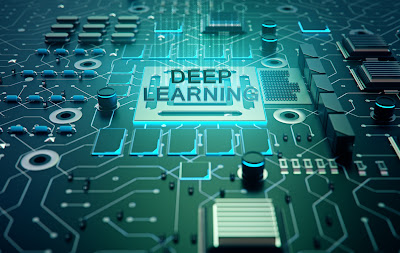Deep Learning improves Adoption of Software Solutions in Various Applications
 |
| Deep Learning |
Deep Learning, also known as deep
neural Learning, is a type of machine Learning that is based on an artificial
intelligence (AI) neural network and representation Learning. A neuron network
is a collection of algorithms that aid in the recognition of data relationships
by simulating how the human brain works. Many problems can be solved using
these networks, including data validation, sales forecasting, customer
research, and risk management. There are three kinds of Learning: supervised,
semi-supervised, and unsupervised. Deep Learning is a machine Learning class or
subset that uses algorithms to solve complex data structures.
Deep Learning applications are
used in a variety of industries, including automated driving. Deep Learning
algorithms are used by automotive researchers to detect various objects such as
traffic lights, stop signs, and so on. Deep Learning is also used to detect
pedestrians, which helps to reduce the number of accidents. Deep Learning has
many applications, including face recognition, signal analysis, weather
forecasting, Google Maps, antivirus, and others.
Companies nowadays have a large
amount of data, which makes it difficult to manage. Cyber-attacks are also on
the rise as a result of increased connectivity via big data, cloud, social
media, and other mobile services. Adoption of social media, cloud, and a
variety of other applications has also increased insider threat into networks,
which can result in significant losses for the IT industry. Deep Learning
solutions in security assist organisations in protecting critical information
and preventing data loss. Furthermore, Deep Learning is gaining popularity in
the fields of social media advertising, search advertising, sales, and
marketing automation.
According to Coherent Market Insights, The global Deep
Learning Market was valued at US$ 5.6 Bn in 2019 and is expected to
reach US$ 31.3 Bn by 2027 at a CAGR of 25.8% between 2020 and 2027.
The complexity of IT
infrastructure, which leads to the cost of employing skilled IT personnel, is a
major impediment to the growth of the deep Learning market. The deployment of
hardware, software, and system integration necessitates the use of experts who
are capable of handling and integrating these models into applications. Hiring
highly skilled resources in organisations is expensive. Several industries have
seen a significant shift in terms of security as a result of the Covid-19
pandemic. The growth of the deep Learning market has been significantly
influenced. Furthermore, several cases of cybercrime have been reported. The
cyber threat has grown as every demographic has searched for information about
COVID-19 using a malicious domain name registered with names like COVID-19.
According to Palo Alto Networks
Inc., at the end of March 2020, approximately 40,261 suspicious registered
domain names were identified. Furthermore, in recent years, identical business
email addresses have been used to carry out cyber-attacks. Because of the
increase in cyber threats, many organisations are implementing deep Learning
solutions and configuring malware protection, detection, and mitigation
strategies, and deep Learning can be very useful for organisations to save from
threats and attacks.



Comments
Post a Comment